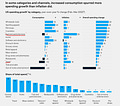Gas shortage, meet money shortage
A recession is unlikely to solve an energy shortfall, but that won't stop us from trying! Plus, scenes from the housing market and bullish on BNPappLe
The why and what of this inflation aren’t actually that complicated, so why are we doing it exactly wrong? Random Walk makes some predictions and has never wanted to be wronger.
Gas, Gas, Baby
Energy inflation is not the same as goods inflation
The recent CPI report shows inflation coming in hot. Inflation is bad. We must raise rates to cool the economy and so the Fed did. Money is now more expensive. Things like houses that require lots of borrowed money are now more expensive. Stocks are now a lot cheaper.
Good news, right? Random Walk has long taken the position that inflation is not transitory and that monetary policy (rates) has at least something to do with it. Random Walk should be happy that consensus has finally caught up. Right . . ?
Wrong.
The thing about inflation (and prices generally) is that it’s a composite signal of supply(ies) and demand(s). In the case of the CPI, it’s really a bucket of prices—a composite of composites (of composites), if you will. Prices can indeed …
Keep reading with a 7-day free trial
Subscribe to Random Walk to keep reading this post and get 7 days of free access to the full post archives.



